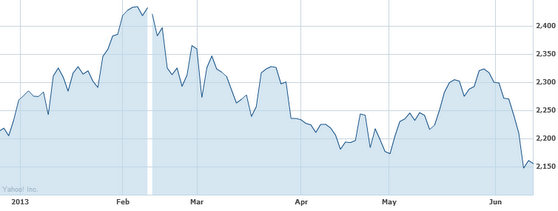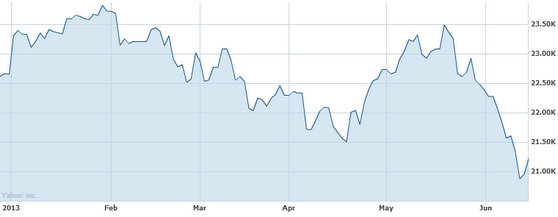Main reference: Story in Sinafinance
AN INVESTOR from Chongqing, a city known for its numbingly hot cuisine, hit a major hot streak of his own, turning 70,000 yuan into two million.
Mr. Hu, a 43-year-old investor from the Southwestern Chinese metropolis, has been a client of Shenyin Wanguo Securities.
As far as A-shares go, most shareholders would be happy with long-term average annual returns of 8-10%, comfortably ahead of inflation and far better than savings accounts would offer.
 Former chauffeur Mr. Hu from Chongqing (above) made a pretty penny with patient investing. Photo: baikeBut Mr. Hu has won for himself the above-mentioned windfall, which over an eight-year period represents a compounded annual growth rate in excess of 50%.
Former chauffeur Mr. Hu from Chongqing (above) made a pretty penny with patient investing. Photo: baikeBut Mr. Hu has won for himself the above-mentioned windfall, which over an eight-year period represents a compounded annual growth rate in excess of 50%.
That’s not bad for a former chauffeur who first started tinkering with small-scale share investments to help support his family.
Needless to say, he no longer gets behind a wheel to make money, but only to chauffeur himself and his nouveau riche family around town.
But his investment journey hasn’t always been a smooth ride, as he once lost 65% of his entire capital on bad bets.
However, these days Mr. Hu is sitting pretty, has put on a bit of weight, and looks quite content as if without a care in the world.
He explained that the reason for his easygoing attitude of late is the fact that he hasn’t bought or sold a share in months.
Apparently, his tremendous self-control and ability to know when to quit -- and stay quit -- while ahead is something he learned from first-hand market experience as well as from the market Masters.
 China shares haven't exactly bowled over investors this year. Source: Yahoo Finance
China shares haven't exactly bowled over investors this year. Source: Yahoo Finance
Mr. Hu first started investing in Chinese equities in 1999, and the following year quit his chauffeuring job with its 1,800 yuan month salary to take care of his 200,000 yuan A-share portfolio at the time.
However, the God of Wealth was not smiling down upon Mr. Hu at the outset, and from a peak level of 2,245 for the benchmark Shanghai Composite Index, Chinese shares began a four-year downward march amid an extended bear market.
During this volatile period, Mr. Hu actually grew his investment by 50% in a short timeframe, but just as soon returned all his winnings to the vagaries of the market.
He said this experience left him with a strong aversion to anything resembling a bear market, despite the apparent bargains abounding.
By 2004, his 200,000 yuan original portfolio had shrunk by 65% to just 70,000, a personal shock which Mr. Hu says helped him come up with a whole new personal investing strategy.
That year of major losses also saw him increasingly turn to others for advice, including a Mr. Li from his brokerage.
Mr. Li gave Mr. Hu an essential reading list of books featuring renowned local and international investors to help cultivate more effective sharebuying techniques and strategies.
 Daytime shot of Chongqing, home of investor Hu and the biggest city in China nobody’s heard of. Photo: gocoMr. Hu would often pull all-nighters trying to absorb as much from the market masters as he could.
Daytime shot of Chongqing, home of investor Hu and the biggest city in China nobody’s heard of. Photo: gocoMr. Hu would often pull all-nighters trying to absorb as much from the market masters as he could.
By year-end 2004, Mr. Hu said he had a newfound understanding of the arts of spotting opportunities, assessing risk and managing wealth as well as an appreciation for the technical aspects of share trading and other data needed to excel in the market – all of which gave him a more rational judgment-making capability.
By employing all these new tricks of the trades, he was able to turn his 70,000 yuan into two million by 2008 for an average ROI of 52%.
“Don’t touch something that shouldn’t be touched,” he said, when asked to sum up the recipe for his success.
The on-and-off bear market for the past five years was something Mr. Hu said he could never have predicted back in 2008, the year he left the market.
He said he continued his “Goldilocks” strategy when he began trading stocks in 2009, not touching anything that seemed too hot or too cold, because they usually assumed that temperature for a reason.
He now has a smaller portfolio and a comfortable savings account, but has hardly tinkered with his shares in almost two years, saying that his readings from the Masters in 2004 taught him lessons in patience that are paying off nearly a decade later.
In 2011, his returns stood at a respectable 15%, thanks he said in large part to his shifting his portfolio focus to new shares and a heavier reliance on corporate bonds.
“In the first half of the year, there was quite a rebound, but it didn’t feel right so I reduced my positions,” he said.
 Hong Kong shares have outperformed China shares this year, but not by much.
Hong Kong shares have outperformed China shares this year, but not by much.
Source: Yahoo Finance
Mr. Hu said recent bouncebacks are not at all alluring to him as he sees no stomach in the market for a sustained recovery and little intrinsic unrealized value.
The Chongqing investor is staying put for now, but is keeping one ear to the ground for any signs or sounds of stampeding bulls.
He says his main concern is holding onto what he has – his portfolio’s value, his bank account, but more importantly – the health and welfare of his wife and child.
Not getting overexcited amid market fluctuations is key to his success, he adds.
From his humble life as a low-paid chauffeur a decade ago, he now lives a comfortable family life with annual expenses of around 60,000 yuan.
“Now, maintaining this lifestyle and paying my bills is my primary concern,” he said.
“For those friends of mine who say they’ve had enough, I tell them to just look themselves in the mirror and honestly admit your own strengths and weaknesses, and then act accordingly.
“Even more importantly, I remind them that to expect overnight success in the stock market is to invite even faster failure.”
But he said that the most important lesson he could give them is that financial success is not just picking and rejecting the right shares, but also having the discipline and wisdom to know how to handle your finances once you’ve built up a sizeable nest egg.
See also:
CHINA SHARES: Sub-2000 Level Only Temporary
 Former chauffeur Mr. Hu from Chongqing (above) made a pretty penny with patient investing. Photo: baikeBut Mr. Hu has won for himself the above-mentioned windfall, which over an eight-year period represents a compounded annual growth rate in excess of 50%.
Former chauffeur Mr. Hu from Chongqing (above) made a pretty penny with patient investing. Photo: baikeBut Mr. Hu has won for himself the above-mentioned windfall, which over an eight-year period represents a compounded annual growth rate in excess of 50%. China shares haven't exactly bowled over investors this year. Source: Yahoo Finance
China shares haven't exactly bowled over investors this year. Source: Yahoo Finance Daytime shot of Chongqing, home of investor Hu and the biggest city in China nobody’s heard of. Photo: gocoMr. Hu would often pull all-nighters trying to absorb as much from the market masters as he could.
Daytime shot of Chongqing, home of investor Hu and the biggest city in China nobody’s heard of. Photo: gocoMr. Hu would often pull all-nighters trying to absorb as much from the market masters as he could. Hong Kong shares have outperformed China shares this year, but not by much.
Hong Kong shares have outperformed China shares this year, but not by much. NextInsight
a hub for serious investors
NextInsight
a hub for serious investors






